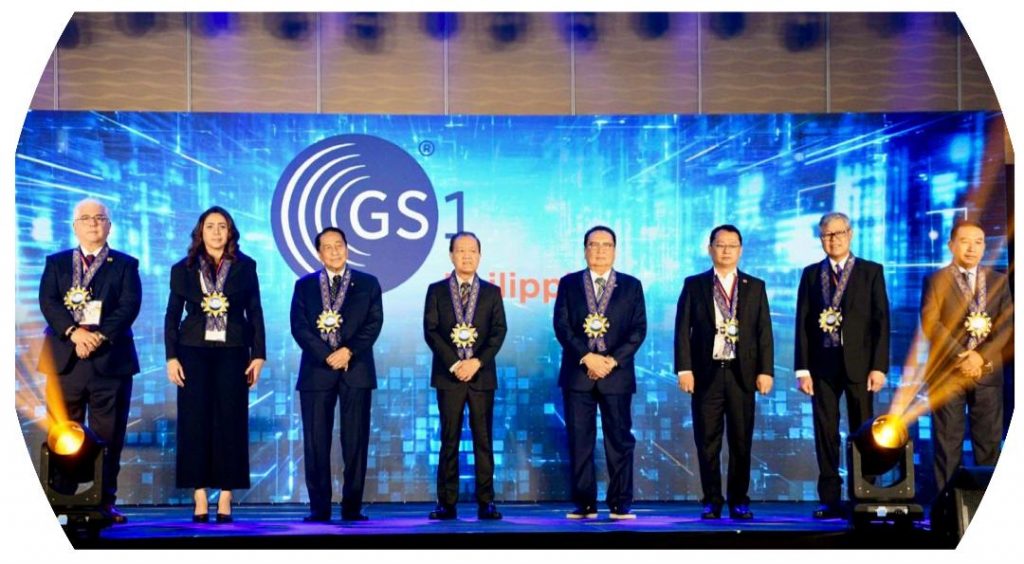Aims to introduce to over 30,000 retailers nationwide by the end of 2024

The photo features representatives from GS1 Philippines present during the organization’s Annual Conference and General Membership Meeting (from left to right): Public Relations Officer Teodoro Padilla, representing the Pharmaceutical and Healthcare Association of the Philippines; Corporate Secretary Anna Marie Anastacio, representing the Chamber of Cosmetics Industry of the Philippines; Trustee Sergio Ortiz-Luis Jr., representing the Philippines Exporters Confederation; President/CEO Roberto Claudio, representing the Philippine Retailers Association; Chairman Atty. Pablo Gancayco, representing the Philippine Chamber of Commerce and Industry; Vice President Comm. Joseph Ross Jocson, representing the Packaging Institute of the Philippines; Carlos Cabochan, representing the Philippines Consumer Centric Association; and Trustee Antonio Sayo, representing the Philippine Food Processors and Exporters Organization.
The premier organization for local barcode standards, GS1 Philippines, recently unveiled GS1 Activate, a web-based tool designed to make barcode generation and symbol creation easier for companies and transform the retail supply chain through digitalization.
GS1 Activate was introduced on January 30, 2024, during the GS1 Philippines Annual Conference and General Membership Meeting. It simplifies the process for businesses to generate barcode numbers and symbols, digitizing product data and identification and enhancing the visibility and efficiency of supply and demand chains both internationally and across sectors.
By adhering to GS1 standards and services, GS1 Activate enables businesses to achieve accurate product identification with global trade item numbers (GTINs) and seamless data sharing, enhancing customer service and operational efficiency. With GS1 Activate, businesses can easily obtain barcode numbers for their products, allowing for their global distribution. Additionally, the service provides expert guidance on printing and placing barcode symbols to ensure optimal scanning performance. By leveraging GS1 Activate to share product data, companies can expand their reach to retailers and marketplaces worldwide, enhancing the visibility and accessibility of their products on a global scale.
GS1 Philippines targets to introduce GS1 Activate to over 30,000 retailers nationwide by the end of 2024. They are currently serving over 5,000 retailers.
“In an economy where the Philippines’ e-commerce market is estimated to reach $24 billion (approx. Php 1.3 trillion) through 2025, GS1 Activate is a game-changer. This new service revolutionizes business barcode generation, reducing the time required compared to traditional product identification methods and eliminating common errors, saving costs on label reprinting and minimizing the need for extensive personnel training. By dramatically simplifying the process, GS1 Activate also enhances efficient data sharing, crucial for strengthening both local and global trade. This launch is a testament to our dedication to advancing digital integration within the Philippines’ supply chain ecosystem, reinforcing our role in the global economy,” GS1 Philippines, and Philippine Retailers Association President Bobby Claudio said.
Aligning with the annual gathering’s theme, “Unified Unlocked: Activating Integrated Digitalization,” GS1 Philippines’ conference marked the 50th anniversary of the introduction of the barcode system and highlighted GS1’s focus on shifting to the 2D migration of barcodes to QR codes while calling for global retail Point of Sale (POS) scanners to be capable of processing 2D barcodes by 2027.
In his remark, GS1 Philippines Chairman Atty. Pablo Gancayo shared, “We are now focused on evolving the barcode into the next level we call the 2D migration, which is expected to revolutionize further commerce. GS1 will guide the industry towards 2D migration, which it hopes to achieve and implement comprehensively by the year 2027.”
The annual gathering hosted insightful discussions, networking, and collaboration opportunities among key government figures, industry players, and GS1 members. Among those present was Department of Trade and Industry (DTI) Undersecretary Mary Jean T. Pacheco, who emphasized GS1 standards’ pivotal role in enhancing supply chain efficiency and visibility for Philippine industries competing globally. During her talk, she discussed the government agency’s three-year food logistics action agenda aimed to revolutionize the food distribution system by addressing critical supply chain gaps and integrating ICT to enhance logistics performance. Undersecretary Pacheco expressed eagerness for collaborations with GS1 Philippines to achieve these goals.
Other government leaders and industry experts also shared their perspectives on the impact of global standards in the digital age, including Department of Information and Communications Technology (DICT) Secretary Ivan John Enrile Uy; De La Salle-College of Saint Benilde School of Environment and Design faculty member and packaging designer and consultant Prof. Ana Maria Veronica Solano; and CLASSchool Founder and Nutraways Manufacturing Corporation General Manager Love Emmanuel Agudo.
GS1 Global Office President and CEO Renaud De Barbuat, GS1 Philippines Trustee and Philippine Exporters Confederation, Inc. (PHILEXPORT) President Sergio Ortiz-Luis Jr., and GS1 Global Office GS1 Registry Platform Global Deployment Lead Joe Horwood were among the dignitaries who graced the occasion.
The Philippine Chamber of Commerce and Industry (PCCI), the Philippine Retailers Association (PRA), Philippine Food Processors and Exporters Organization (PHILFOODEX), the Pharmaceutical and Healthcare Association of the Philippines (PHAP), the Philippine Consumer Centric Traders Association (PCCTA), the Packaging Institute of the Philippines (PIP), the Chamber of Cosmetics Industry of the Philippines (CCIP), the Soap and Detergent Association of the Philippines (SDAP), and the Beverage Industry Association of the Philippines were among the notable industry groups in attendance at the conference.

No Comments